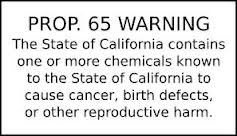We’ve commented before on both the ubiquity and increasing comic absurdity of Prop 65 warnings in California. Prop 65—which requires warning labels on products that contain materials the state deems carcinogenic (including chemicals that are solely carcinogenic in animals)—has been a goldmine for plaintiffs’ lawyers. Its private attorney general provisions provide an abundant source of plaintiffs, who don’t have to show harm to enforce the measure in court. And the promise of attorneys’ fees have provided more than an adequate incentive to ensure that strike suits will be brought. The whole endeavor has resulted in companies defensively labeling everything, and a state plastered in Prop 65 signs whose content has been rendered meaningless by its omnipresence.
While a treasure-trove for lawyers, it can hardly be said that Californians have benefitted from these lawsuits. Attorneys walked away with 74% of Prop 65 settlement awards in 2011, and Californians in turn received the benefit of having been conditioned to the pervasive warnings. Like a cliché, the intentions behind the law (if there were ever were good ones) have been lost. Instead of signifying a warning, the signs now signify something else: frivolous litigation. In other words, to many Californians, the law is one brick short of a load.
Fortunately the Court of Appeals for the Third District of Sacramento has refused to take residents one step further down the path laid with good intentions (and that leads you know where) by rejecting the state’s attempt to list two chemicals “possibly” linked to cancer. In Styrene Information and Research Center v. Office of Environmental Health Hazard Assessment, The court found instead that only those chemicals known to cause cancer may be listed, saving Californians’ eyes from a whole new host of warnings on the several products that contain styrene and vinyl acetate—the chemicals at issue.
Based on its prior cases and maxims of statutory interpretation, the court determined that “chemicals may be included on the Proposition 65 list only if there is a sufficient showing that they in fact cause cancer or reproductive toxicity.” That is, the OEHHA can’t list chemicals subject to Prop 65 warning labels willy-nilly.
Not one regulatory body, international or domestic, has deemed styrene a known human carcinogen (though many have raised the issue of it being a “potential” human carcinogen.) That’s not to say that it’s not carcinogenic. Rather, our sore eyes merely ask for prudence before hampering industry and contributing to the lawsuit mill. Currently, one often learns a new cause of action every day, but thankfully the Court of Appeals is attempting to limit those causes of action to where they are truly appropriate.

